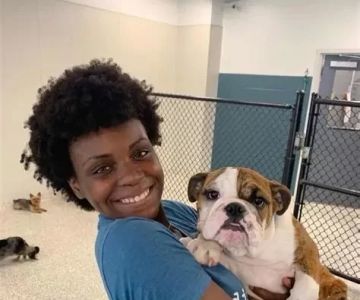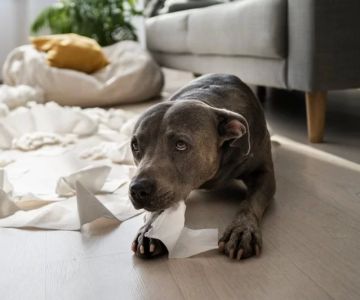How to Help a Puppy with Anxiety
As a new puppy parent, watching your furry companion struggle with anxiety can be heartbreaking. Puppy anxiety is more common than you might think, affecting many young dogs. The good news is that with the right care, patience, and techniques, you can help your puppy feel more secure and comfortable in their environment.
1. Understanding Puppy Anxiety
Puppy anxiety is a behavioral issue that occurs when a young dog feels fearful, stressed, or overwhelmed. Just like humans, puppies can experience anxiety due to a variety of reasons, such as separation from their mother, unfamiliar environments, or even a traumatic event. It’s important to recognize the signs of anxiety in puppies so that you can address the problem early on.
Signs of Anxiety in Puppies
Common signs of puppy anxiety include:
- Excessive barking or whining
- Destructive behavior (e.g., chewing furniture or shoes)
- Pacing or restlessness
- Drooling or panting excessively
- Refusal to eat or drink
- Hiding or cowering in corners
If you notice any of these behaviors in your puppy, it could be a sign of anxiety. It’s crucial to address the issue promptly to prevent it from escalating as your puppy grows.
2. Why Do Puppies Experience Anxiety?
There are several reasons why puppies may experience anxiety, and understanding the root cause is key to helping them. Some common causes of puppy anxiety include:
- Separation Anxiety: Puppies are naturally attached to their owners and may experience stress when left alone for the first time.
- Fear of New Experiences: Exposure to new sounds, smells, and environments can overwhelm a puppy, leading to anxiety.
- Trauma or Negative Experiences: Puppies who have experienced neglect, abuse, or a frightening event may develop anxiety as a defense mechanism.
- Genetics: Some dog breeds are more prone to anxiety due to their genetic makeup.
By identifying the specific cause of your puppy’s anxiety, you can implement targeted solutions to help them feel more secure.
3. How to Calm an Anxious Puppy
There are several strategies you can use to help calm an anxious puppy. Patience and consistency are key in reducing anxiety over time. Here are some proven techniques:
1) Create a Safe and Comfortable Space
Provide your puppy with a designated safe space where they can retreat when feeling anxious. This space should be quiet, comfortable, and free from distractions. A crate with a soft bed or a cozy corner with their favorite blanket can offer a sense of security.
2) Practice Positive Reinforcement
Reward calm behavior with treats, praise, and gentle affection. Positive reinforcement helps your puppy associate calmness with rewards, making them more likely to repeat the behavior. Avoid punishing your puppy for anxious behavior, as this can make the anxiety worse.
3) Introduce Calming Scents
Certain scents, such as lavender or chamomile, are known for their calming properties. Using a pet-safe calming spray or diffuser can help soothe your puppy’s nerves. Always ensure that any products you use are specifically designed for pets to avoid harmful effects.
4) Exercise and Mental Stimulation
Physical activity and mental stimulation are excellent ways to alleviate anxiety in puppies. Regular walks, playtime, and puzzle toys can help reduce stress and provide an outlet for excess energy. A tired puppy is often a calmer puppy!
5) Desensitize to Triggers Gradually
If your puppy’s anxiety is triggered by specific events (such as being left alone or loud noises), try to desensitize them gradually. For example, you can practice short departures, progressively increasing the time you leave them alone, while ensuring they remain calm. This helps your puppy become accustomed to the situation without becoming overwhelmed.
4. Professional Help for Puppy Anxiety
If your puppy’s anxiety persists despite your best efforts, it may be time to seek professional help. A veterinarian or a professional dog trainer can assess your puppy’s behavior and recommend a treatment plan tailored to their needs. In some cases, anxiety medications may be prescribed to help manage symptoms, but this is typically a last resort after other methods have been tried.
At Hidden Brook Veterinary, we offer a variety of services to help you care for your puppy, including behavior consultations, training programs, and products that promote calmness. Our expert team is here to guide you through every step of the process and help your puppy feel at ease.
5. Real-Life Story: Helping Max Overcome His Anxiety
Max, a 6-month-old Golden Retriever, came into our clinic with severe separation anxiety. His owner, Sarah, noticed that Max would bark uncontrollably whenever she left for work, and would even chew on furniture in distress. After an initial consultation and behavioral assessment, we recommended a combination of crate training, positive reinforcement, and desensitization exercises.
After several weeks of consistent practice, Sarah reported that Max’s anxiety had significantly improved. He began to feel more comfortable being left alone for short periods of time, and his destructive behavior decreased. Max is now a more relaxed and confident puppy, and Sarah continues to implement the techniques she learned during the training sessions.
Sarah’s story is just one example of how patience, consistency, and the right approach can help a puppy overcome anxiety. With the proper support and care, your puppy can lead a happier, more relaxed life.












